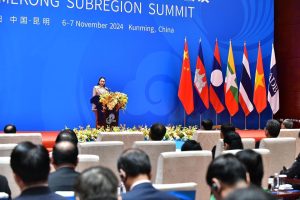Thailand’s Prime Minister Paetongtarn Shinawatra met with the head of Myanmar’s military junta in China yesterday, as her government prepares to hold an “informal consultation” on the country’s conflict next month.
Paetongtarn, who took office in September after her predecessor’s removal from office, met with Senior Gen. Min Aung Hlaing on the sidelines of the 8th Greater Mekong Subregion Summit in Kunming.
“We had a private conversation and there was nothing unexpected,” Paetongtarn told reporters of the meeting, according to Reuters. “I offered our goodwill to cultivate peace.”
The Thai leader did not offer any more details of the conversation. But since her Pheu Thai party returned to power last year, Thailand’s government has promised to play an elevated role in resolving the conflict that has raged since the military coup of February 2021. So far, the main manifestation has been the establishment of a humanitarian corridor that has been endorsed by the Association of Southeast Asian Nations (ASEAN).
Speaking at last month’s ASEAN Summit in Vientiane, Paetongtarn said that Thailand, which shares a 2,416-kilometer border with Myanmar has offered to host an ASEAN Troika Plus meeting in December, to try to find a way forward. This will be coordinated by Indonesia, Laos, and Malaysia – the last, current, and future ASEAN chairs (hence, “troika”) – but will also include any other member states that wish to participate.
“ASEAN should send a unified message to all parties in Myanmar that there is no military solution. It is time to start talking,” she told a meeting of ASEAN leaders. “Thailand is ready to help.”
Thailand’s intervention is an attempt to find a way to force the implementation of ASEAN’s Five-Point Consensus peace plan, which has been more or less moribund since its formulation in April 2021. The military junta in Myanmar has refused to heed the agreement’s call for an immediate cessation of violence; nor has it shown any willingness to engage with “all parties” to the country’s conflict, instead branding them “terrorists” and seeking to eliminate them by force.
It has also vociferously protested any suggestion that ASEAN might engage directly with resistance forces such as the National Unity Government. Restricted by its operating principles of consensus and non-interference, the bloc has had little power to compel or punish the Myanmar military for refusing to implement the Five-Point Consensus.
Unlike the earlier initiatives undertaken by Prime Minister Prayut Chan-o-cha’s government, which sought to engage directly with Min Aung Hlaing and his associates, Thailand’s more proactive role is designed to complement ASEAN’s approach. However, while Thailand’s initiatives are unlikely to undermine ASEAN’s efforts, it is also unclear whether Thai diplomacy can square the terms of the Consensus with the political realities inside Myanmar.
Over the past three-and-a-half years, Myanmar’s conflict has long taken on the contours of a revolutionary struggle – one that leaves very little room for a negotiated settlement. Both sides have described their opponents as “terrorists” with whom there can be no meaningful political intercourse.
For many in the resistance, too much blood has been shed to accept any role for the military in Myanmar’s political or economic life. Meanwhile, the military remains wedded to its self-perception role as the defender of the union, and the only thing standing between national unity and disintegration. While Min Aung Hlaing says that he is open to talks with resistance groups in northeast Myanmar, a call that he repeated in Kunming this week, there is nothing in the army’s intensely cloistered and self-absorbed internal culture that suggests any willingness to compromise – even as its areas of effective control continue to recede.
To be sure, this is not a prescription to give up on diplomacy. It makes sense to keep the channels of communication open, awaiting the moment that the political situation changes enough to make discussions possible – and here Thailand, as perhaps the nation most directly affected by the Myanmar conflict, has an important role to play.

































